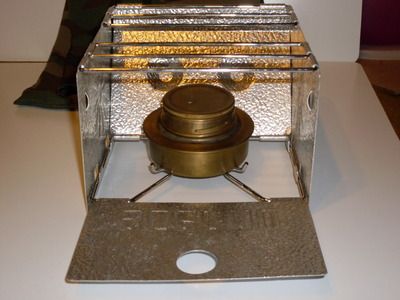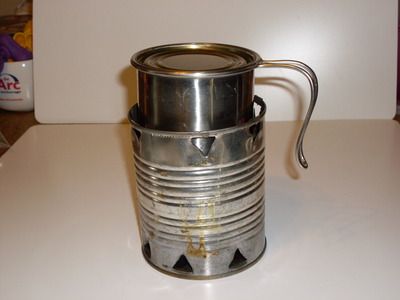Chapter Three
Fire and Light
"Come on, Baby, light my fire"
The Doors
One need only look at the poor souls
wandering the streets of their ruined cities after a natural calamity
for motivation to have a small kit ready at hand to provide some
basics - after all, a shelter may not be available for some time.
Cooking food and boiling water is a primary consideration after a
disaster.
I want to discuss stoves first. While
it is possible to build a campfire, which I discuss last, a stove
provides many advantages. A small stove is easy to light, provides
controlled heat, works in nearly any weather and can be shut off when
you are done cooking or boiling your water. A stove suitable for you
kit should be small, lightweight, produce enough heat to boil water
in a reasonable amount of time and use commonly available fuel - fuel
which is safe to store in the kit.
For this DIY kit, I would recommend a
Sterno brand folding stove. It folds flat, will easily support a
large pot is easy to light and snuff - and because it burns gelled
alcohol, may be used safely indoors with minimal care taken for
ventilation. One large (7 oz) can of fuel is rated by the vendor to
burn for two hours. At ten minutes to boil two cups of water, you
should be able to produce (about) 24 cups of hot water before the
first can is used up.

Sterno brand stove with Trangia burner
Another good choice for cooking is a
Trangia brand alcohol stove (burner). Heat output is the same or
slightly hotter than the Sterno brand product. The Trangia burner
may be used with the Sterno stove. Trangia sells cook kits
incorporating the burner, but can be costly.
Alcohol burners are safe to use indoors
with proper ventilation, the only caution I have is that alcohol
burns with an almost invisible blue flame - so a fuel spill is a
concern. If any fuel is spilled - absent an ignition source, it will
evaporate quickly and leave no residue or offensive order. Fuel may
be obtained at the local gas station in the form of the yellow bottle
of HEET brand fuel antifreeze. Bottles of 91% alcohol may be found
at most Big Box stores for under 2 dollars for 16 ounces - a less
expensive source.
There are numerous camping stoves that
are compact and provide excellent heat. I would suggest that other
than so-called canister (propane/Butane) stoves, none are really
suitable for safe indoor use. The cost of the fuel canisters is also
a consideration.
Another strike against these compact
camping stoves is their stability - you must be quite careful to
avoid tipping over your cooking pot. Storage of volatile petroleum
fuels like gasoline or kerosene is another major drawback - for this
kit.
Having said that, larger or full sized
'camping' stoves, propane fired, may be a good item for use at home
in the event of a loss of utilities. The venerable Coleman brand
stove may be had as a propane appliance or an adapter is savable to
convert a Coleman brand gasoline stove for propane use - for less
than twenty dollars! Proper ventilation must always be a
consideration when using these larger stoves indoors.
Don't want to spend money on a stove
that will sit in a kit unused? Okay, a Sterno folding stove does
sell for 5 to 9 dollars, the fuel, is about four dollars for a large
can. Any can of a diameter to hold the fuel container may be pressed
into service as a pot holder for your fuel. (See photo)

The holes in the sides were made with a
common can opener, the fuel can is held by two short sections of coat
hanger wire. The holes for the wires were made with a small drill
bit.
The only critical measurement is to
ensure the top of the fuel can is 32mm to 38mm (1.25 to 1.5 inches)
from the top edge of your pot support. DO NOT use gasoline or
kerosene in this or any alcohol stove.
What about these so-called soda pop
can stoves? Are they any good?
There are a large number of plans to
make an alcohol burner out of soda or beer cans. They work, but are
fragile. The Trangia brand burner, made from brass, is very rugged
time proven design. You get to chose, it's your money.
Can I use isopropyl alcohol in one
of these stoves?
It's also called 'rubbing' alcohol. If
the alcohol is 91% - yes. If the alcohol is marked at less than that
- usually 70%, then no, it is not suitable for use in the burner.
How do I put out the flame on my
Sterno fuel?
Simply place the lid back on the can,
loosely, and the flame will extinguish. Once the can of fuel cools,
press the lid firmly in place.
On a Trangia burner, the so-called
simmer ring is used to snuff the stove.
What other kinds of fuel can I use
with my alcohol setup?
There are other brands of 'chafing
dish' fuel - read the labels carefully. All are alcohol based, other
alcohol sources, like yellow bottle HEET fuel-line antifreeze burn
cleanly as well. Remember, extra ventilation is needed for any
indoor use.
Campfires -
I'll be honest, I'm not a fan of open
fires for use in a disaster situation. They are a potential source
of out of control fires, burns and can produce noxious smoke.
Cooking over an open fire is a skill, so some prior practice is
strongly suggested.
An open fire will produce both heat and
light. And smoke. A campfire requires an open space, with nothing
flammable overhead, for safety and a source of fuel. People living
in an urban area will be hard pressed to find a viable source of dry
fuel to maintain an open fire for any length of time. Bad weather,
such as rain and/or high winds also impact on your ability to keep
that fire going.
IF you live in an area where fuel is
plentiful, by all means, plan on using an open fire for your cooking
needs. You'll need more than a few strike-anywhere matches for this,
especially if your wood is wet. For those in urban areas, remember
that some treated wood products will outgas poisonous gases when
burned, so do all of your cooking outdoors, unless your indoor stove
is properly vented.
Light in a grid-down situation can be
provided by flashlights, lanterns, and candle lanterns.
For short term situations and small
size, it is hard to beat the common flashlight and with the newer LED
'bulbs' battery life can be excellent. For your DIY kit, any number
of low cost LED flashs are available, so many that I won't make a
specific recommendation. If you already own a MagLight brand flash,
retro fitting for LED 'bulbs' is simple, with a drop in replacement -
check the flashlight section of your local Big Box store. I
converted my smaller "AA" battery MagLight for just a few
dollars.
A headlamp, ("AA" and LED) as
part of your kit will allow you to keep your hands free as you
perform a variety of tasks. Again, there are so many low cost lights
on the market, I'll just say, consider adding a headlamp to your kit.
The only lanterns that I am aware of on
the market for possible inclusion in this kit are candle lanterns and
a single kerosene insert made for a specific brand of candle lantern.
I purchased and have used an older miniature kerosene lantern (also
called a canoil) and found it lacking. The kerosene insert has more
than a few bad reviews, so I've mentioned these in passing with a
recommendation to take a pass on these.
Candle lanterns, such as the UCO candle
lantern have been around a long time. Well built, they enjoy a
following with replacement candles readily available on line. I have
used these for years and with the limitations of a candle lantern,
they provide a usable light - burning for about eight or nine hours
for a single, full size candle. UCO also makes a lantern which uses
the popular tea candles. Either would make a good secondary light
source for your DIY kit. Just remember that storage conditions, heat
is not kind to candles.
How you might use a so-called Dakota
fire pit, a rocket stove and other efficient ways of cooking with
wood is covered, with images, in the book.
Very good info, thank you!
ReplyDeletePerfect article for Hurricane Sandy. We are expected to lose electricity for up to a week. Ugh. Lisa
ReplyDeleteWe wish you the best, Lisa, and hope you get safely through the hurricane. Let us know, afterward. Maybe you could share the story of your experience with us. Some of us, like me, have never been through a hurricane and this one seems particularly bad.
DeleteExcellent article! I shared it on Facebook thinking some of my friends may need this information right now.
ReplyDelete